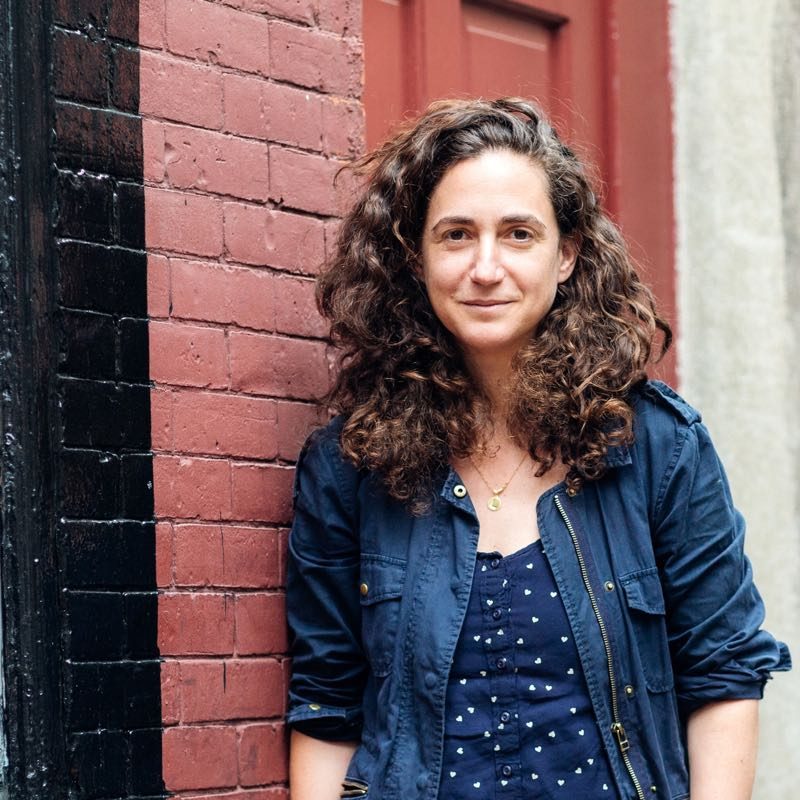An Interview with Daniella Topol
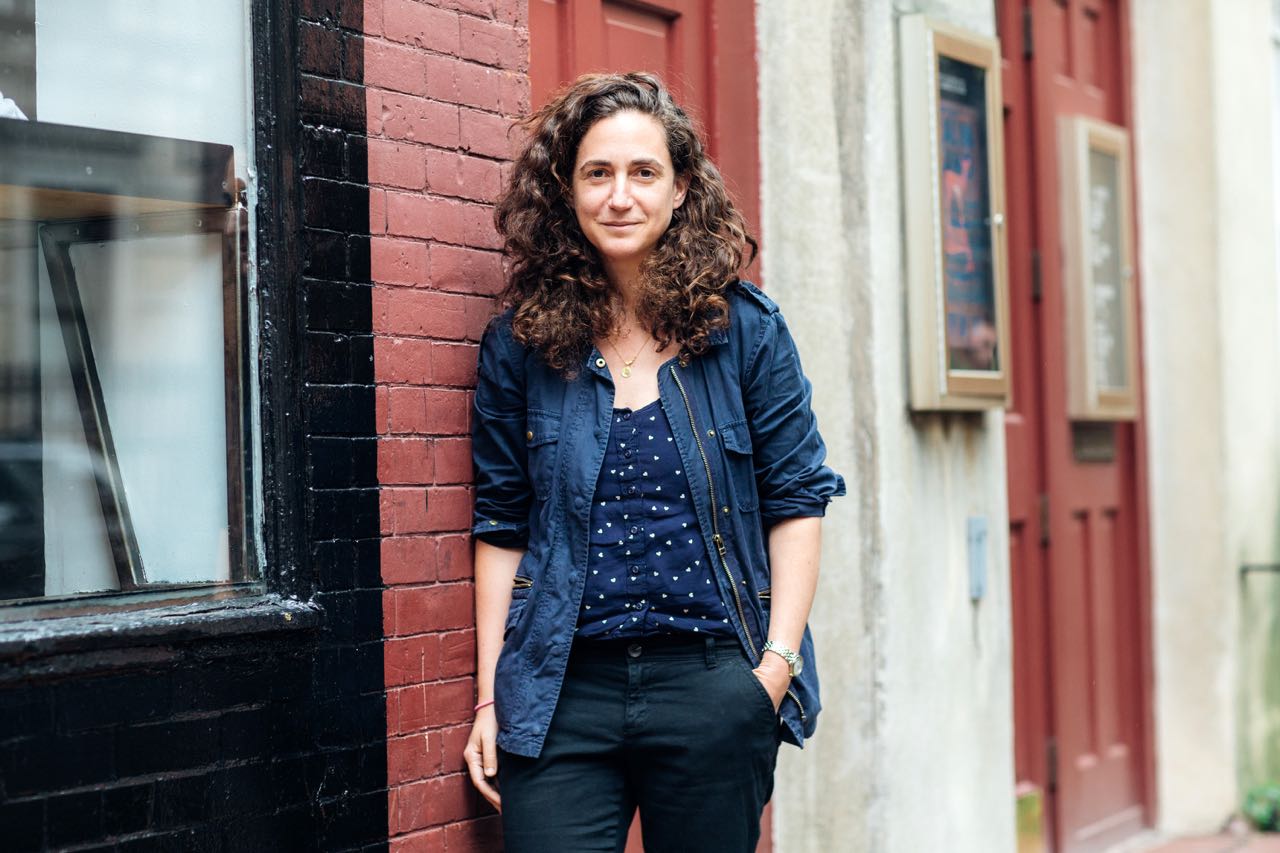
Written by Victoria Myers
Photography by Melodie Jeng
June 14, 2016
On Waverly Place between West 11th and Perry St.—in a certain triangle of the West Village formed by an artisanal shaved ice shop, an abandoned sex store, and the exterior for Carrie Bradshaw’s apartment—up one flight of stairs is the Rattlestick Playwrights Theater, which is dedicated to producing a unique array of emerging playwrights. Earlier this spring, Daniella Topol was named Rattlestick’s new artistic director—the second in the company’s 21-season history—and she now stands on the set of their latest production, Cal in Camo, in front of a painted ombre backdrop. This interview is just one of the many things she has on her schedule for today as she oversees the completion of Rattlestick’s current season and prepares for the next. But her years as a freelance director focusing on new work have prepared her well for the demands of being an artistic director. For the Rattlestick she directed this season’s Ironbound, and previously Charles Ives Take Me Home. Her other directing credits include numerous productions at Women’s Project and theatres around the country, from South Coast Rep to Barrington Stage. She was also previously the New Works Program Director at the National Alliance for Musical Theatre and Artistic Program Director at the Lark. We spoke to Daniella about the life of an artistic director, her plans for the future of the company, developing new work, and more.
Can you just walk me through your day as an artistic director?
There is definitely no such thing as a typical day. Every day is so different and unique. I’ve only been an artistic director for two and a half months. I’m also learning what the days are and what the rhythm of it is. For example, this morning I had a 10am marketing meeting, rehearsal from 11-3 of a new play, you and I are talking now, then I have a fundraising meeting, then I’m going downtown to check in on this other project that I’m working on. Then I’m going to go see a reading of a musical that we might be interested in working on. That’s at 7:30, and then I’m getting back here to facilitate the talkback after Cal in Camo. The day involves multiple components about making art, and finding the money to support the art, and what the staff needs to get the art out there. It really is a complex matrix that I find very, very unique and challenging and very, very exciting and interesting.
What are some of the goals you have for Rattlestick?
David Van Asselt, the founder and artistic director that I’m succeeding, has done an amazing job creating and producing exciting, ambitious, and fearless work, and I feel so lucky to take the reigns of a company that is known for its artistic ambition and integrity. I feel like my job is now to build on that. For me, that means many things, and I’ve been thinking about this quite a lot. It is a bunch of different areas. It means, of course, continuing to find the exciting, ambitious, complex, plays by new writers and producing them and giving them the kinds of productions that they deserve. It means keeping our alumni writers, our writers that we have worked with previously, part of our fold. We have a young company called Middle Voice, which is an apprentice company. It’s a group of diverse artists who are actors and directors and playwrights. They are 18-30 years old. They are mentored by Lucy Thurber. It means supporting them and their vision and their work, and really having their energy and voices and artistry working alongside the other parts of the company. It means creating really unique kinds of partnerships. We’re partnering with Page 73. I’m producing a play next season. We are partnering with the Sol Project to do a play with Latino actors later on next season. We’re partnering with New Georges on developing new work. Partnerships have been part of the DNA of the company for a long time, but there’s a great potential and sort of more opportunities. Also, we’re looking at really unique audience development strategies to make sure that different kinds of audiences are coming in to see the work. I’m exploring potentially trying to do a concert series for music and have more music in this space. It’s so many different things right now, but I think ultimately what it really comes down to is, how do we engage the exciting and interesting artists in all parts of their career to find and work at Rattlestick and make it their home? How do we bring more and more audiences to the work? We just finished doing this amazing new lab for actors who write. Rattlestick did Halley Feiffer’s first play, and Jesse Eisenberg’s first plays. We’ve [worked with] a lot of actors who write plays, and there are a bunch more interesting actors who write, and we just did an amazing lab that was the germ of some really exciting ideas by some amazing actors. All of this is to say, what are the new ways of generating work, of developing work, and of producing work?
Could you talk a little bit more about your plans to engage new audiences? Such a huge part of the current conversation is how to get new and different audiences to come to the theatre.
We have a lot of different things in motion right now. We’ve done three talkbacks for Cal in Camo. We have our fourth one tonight, and they’ve been amazing experiences for the audience to talk to each other. That’s not new by any stretch of the imagination. We have a really intense social media interaction with our audience. It’s pretty intense. We have a dedicated intern that spends 18 hours a week just on social media right now, which I think is just the reality of how people communicate [today]. We solicit feedback from every performance from our audience and invite them to respond to the play, and particularly email us for that engagement. I think it becomes about communication. Our ticket prices are really low. We could charge more money, but we don’t want to charge more money because we really want this theatre to be accessible. Over the summer we’re going to be doing some focus groups to actually talk to our audience to better understand who they are, how they want to be talked to, what ways they want to be communicated with, what programming interests them. I think we just need to spend time talking to the people who come here in order to continue to grow. I think this concert series is part of this idea of how do we have innovative programming that continues to attract people—non-theatre people—in other ways to be coming to the theatre. In Cal in Camo, Paul Wesley is in the show and he’s a big TV guy. Paul came to the show and the show came to him, and it was a great synergy. This is his first play. We have a lot of audiences who are very obsessed with his television show [The Vampire Diaries]. It is really an amazing thing to feel like they came into the theatre because of Paul, but they are seeing the first show that they’ve ever seen and they’re so moved by it. We are definitely artist driven, but I think our responsibility, then, as a theatre is to go, how do we continue to engage that new audience in coming to the theatre and to understand that this can actually be a viable place for them? We’ve got lots of different kinds of programs in the works to continue to build on this energy that I think the company has.
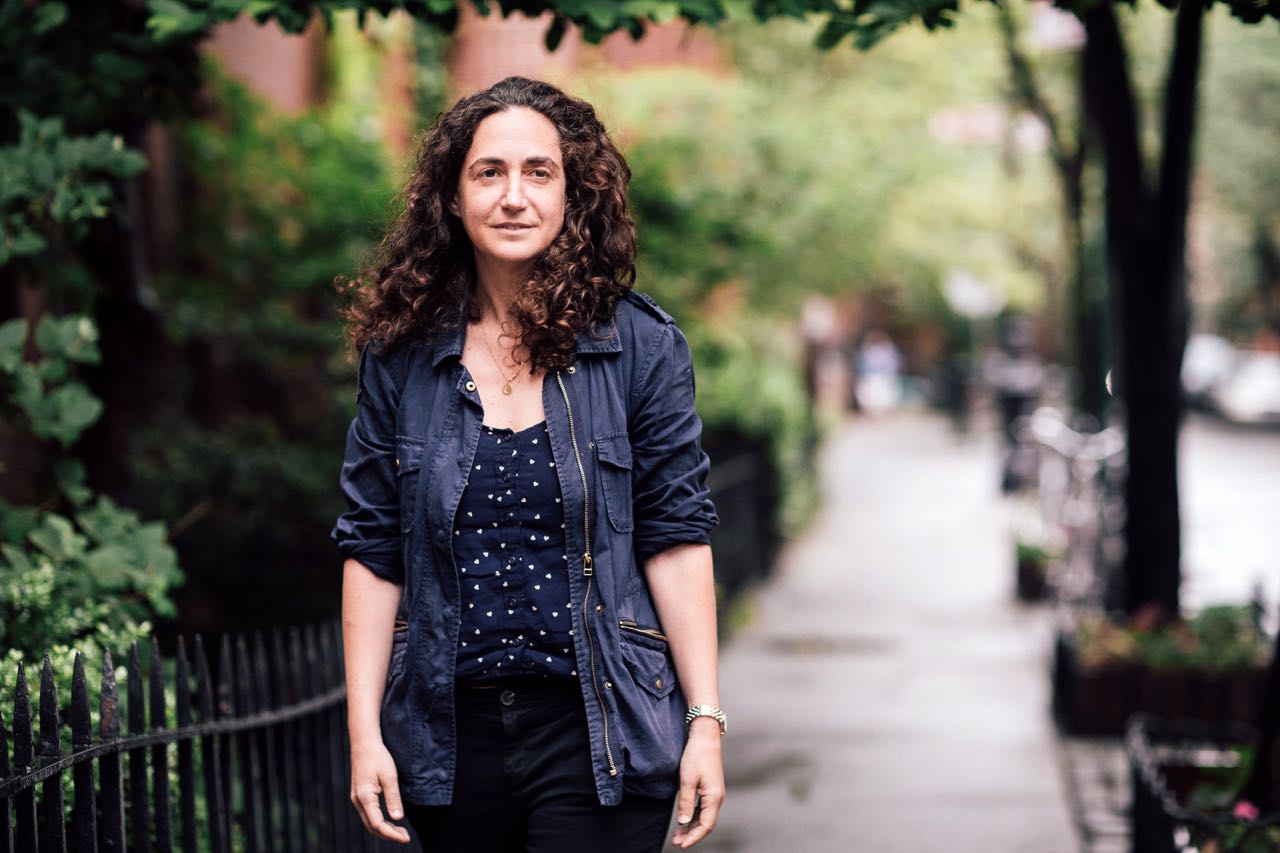
When you’re making plans, do you tend to think in a way of, let’s reinvent the wheel, or are you kind of more like, okay, let’s not reinvent the wheel, let’s examine the wheel and see how we can just make a nicer wheel?
I think I’m in the process of examination. I think I’m reinvention when necessary. It’s not actually reinvention. The company is filled with these amazing artists and different aspects to how it works. I feel like my job at this moment is to understand how all facets of the company work and to make sure that we’re doing our best work in all different strands. I don’t think it’s about reinvention right now at all. I mean, talk to me in a year, I might have a lot of different thoughts than I do now. I have been working with David for nearly a year on taking over the reigns to the company. I’ve been spending a long time with David in a planning mode. I don’t even know anymore sort of what’s new and what’s examined and what’s reinvented. It’s all very organic. I think I’m just trusting that the change is happening in a very organic way. I’m a director who specializes in new work. I’m not afraid of making changes while keeping the essence of the thing. I feel like that’s what new work development is, and that’s what new work production is, and that’s in a way what this moment for the company is. I should say that David is focused on building Rattlestick West in LA with Scott Haze and James Franco. The idea is that Rattlestick in LA, though a separate company and a separate 501c3, will talk to Rattlestick in New York, so that ultimately we’ll be able to share projects bi-coastally and we’ll be able to share artists. We’re just in the beginning stages of that process, but I think that’s an exciting moment that will be very new for both David and myself about how the coasts talk to one another.
When it comes to programming, do you see your role as artistic director as kind of steering the ship in terms of what the institution is known for and what the best plays for the institution are, or do you tend to go more towards your personal taste and what you feel you can bring to it that way? Or some place in between that?
I think they’re one and the same. I think that the reason why I’m now the artistic director of Rattlestick is because what is interesting to me is also what the company does. I had the opportunity to direct two plays for Rattlestick: Charles Ives Take Me Home and Ironbound, and both of those plays are near and dear to my heart and they really speak to what I’m interested in aesthetically, and they speak to what the company is interested in aesthetically. I feel so lucky that the company that I’m running is a company that is known for taking on really complex, emotional plays, and is also focused on jump-starting playwrights’ careers, and I feel like that’s everything that I care about. Rattlestick feels very personal to me. It is very much of my heart, and I imagine that my programming choices will go hand in hand with what I personally can stand behind and what the company can stand behind. I don’t know how to look at it any other way at this moment. In a few years, I will have more of a perspective on programming and the programming that my predecessor did and the programming that I’m doing, but I’m really in the trees right now, so I don’t know that I have any other thought about that right now.
What is your process like for picking plays in terms of what life is right for them? For example, “We like this play. We think it’s ready for production,” vs. “We like this play. We don’t quite think it’s ready for production, but we want to be involved”?
Again, I’m in this moment of programming right now. For example, Page 73 and I are in the middle of figuring out what the play is that we’re going to co-produce, so we’re in the middle of figuring out what plays speak to their company aesthetically and personally and artistically, and what plays speak to me and to Rattlestick, and then we’re coming together on those plays and reading those plays out loud and figuring out what makes the most sense and what we both can stand behind. I’m just trying to look at it as what plays would I want to be sitting in the back of the theatre watching night after night? What plays are speaking to audiences in ways they haven’t been spoken to before? What plays can I go out and raise money for and write grant proposals for because I believe in them, and I understand them, and there’s a need for them, and there’s ambition behind them? That’s how I’m looking at the programming choices right now.
How do you pair directors to projects? Do most projects come with a director or, when that’s up to you, what is your process like for assembling a team?
I’m just in the process of sorting this out, [but] I think it’s really helpful that I’m a director. We’re a playwright’s theatre, so we will first turn to the playwright and say, “Who are the directors that you will trust with your play?” That is the first and foremost question, and how it tends to work is that the playwrights will say, “Okay, well I have this shortlist of people.” If there’s somebody that they absolutely feel passionate about that I don’t know at all, I will of course be open to that, but oftentimes I think it’s about, “Oh, these are the people that they feel passionate about, and I also feel passionate about those couple people on that list,” and so we’ll just prioritize. Then, once the director is picked, really the decisions for the production are—my predecessor David said this and I will stand by this—are 80% up to the playwright and director. It’s really their production. It’s their production that I’m going to stand behind and I’m going to support and I’m going to respond to, and I’m going to try to get them the resources and the right people to support their vision, but at the end of the day, by programming a particular play, I am trusting that playwright and his or her vision, and once that director is picked, I am trusting that particular director’s vision for their production, and that feels very important to me in that way of staying really artist driven.
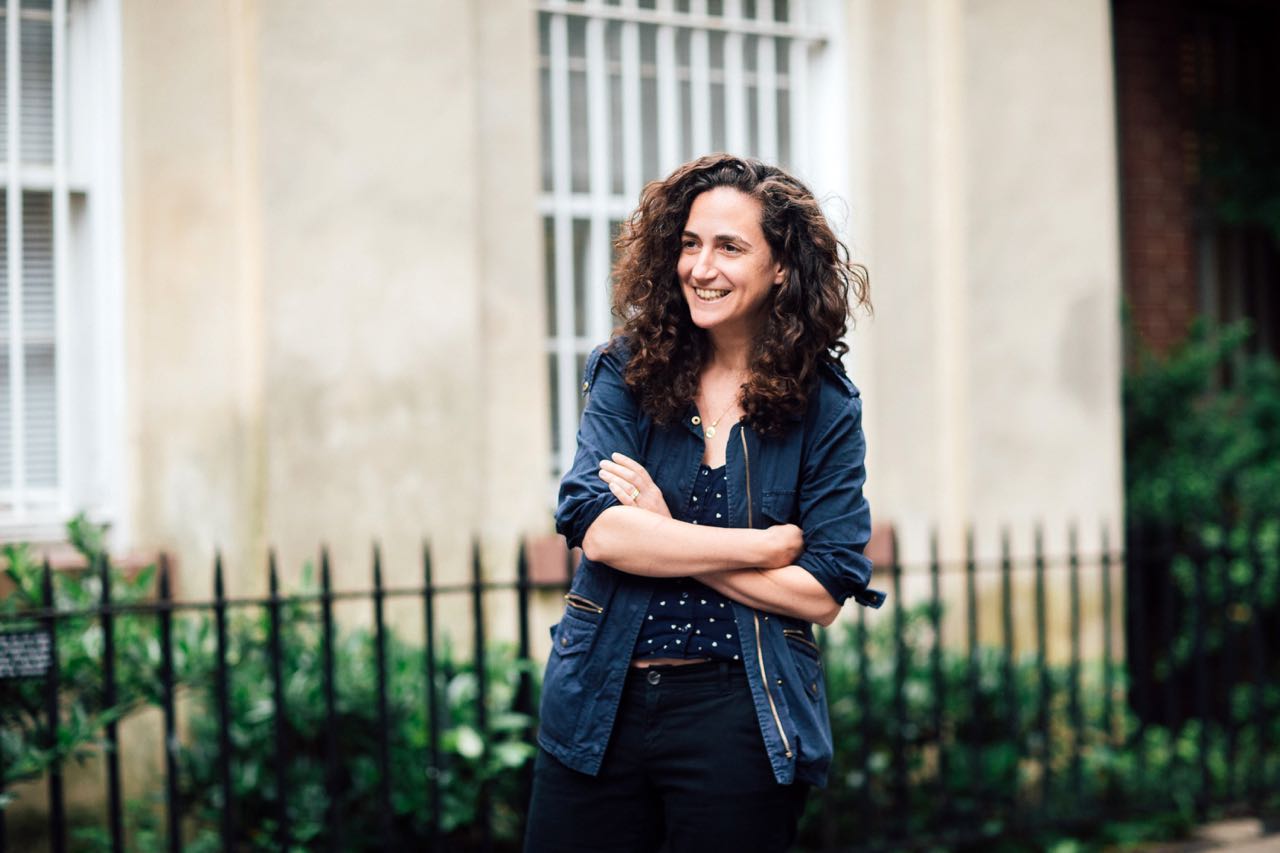
You mentioned a few times the idea of, “ask me a year from now.” Leading a company is about the long term and it’s not just about one season. It’s about many seasons, and things don’t happen overnight. How much of that is part of your thinking in terms of, “This could be an interesting idea, but we might not quite be there yet,” and balancing all that? Part of being the boss is knowing when the right time to do something is.
I feel like I am definitely gathering some interesting ideas and relationships, not just for this upcoming year, but for the future years. We do our own play festival and we’re talking about doing a play festival also with Araca, and I feel like both of those opportunities are going to afford me the opportunity to test out new plays and see how they’re working. Because I’m so interested in partnerships, and it’s already happening that various different theatres and artists are coming to me with ideas of plays or plays that already have another theatre behind them that want a partner in them, so I think I am being reactive and proactive simultaneously, and just finding these amazing plays and figuring out, is their home a Rattlestick home or is their home another home, and is their home a Rattlestick home in the near future or in the far future? I’m definitely doing all that thinking right now, and that really taps into the way that I’ve thought as a director for years, because I think, as a director, I have worked on developing many plays in a year. I can’t even count how many plays I’ve worked on in a year, and some move on to production and some don’t. Some need lots of development and some don’t, and some ultimately need to retire, and some need to go onto some other director. I’m really used to that complexity. That doesn’t scare me. That actually is very interesting to me. I’m interested in the plays that have yet to be written that I can help inspire to be written.
So much of directing seems to be about multitasking and being able to make those decisions very quickly and make it look very, very easy so everyone else stays calm.
Yes. I’m not a stranger to all of that complexity. I’m in the middle of solidifying what we’re doing next season, and obviously I want to be quite methodical about what those choices are. I ideally want the space to be lit as much as possible so that there’s always something happening at Rattlestick, but I also want to make sure that the work that is here is fully supported and has the integrity and production values and all those things that it needs. I’m in the middle of sorting out what all of that actually is.
The fundraising side of things, is that a little different?
To be honest, I’m surprised, but I actually don’t find it as daunting as the rumors make fundraising out to be, and I think it’s because I really, really believe in what Rattlestick is doing. I really believe in the company, so I don’t feel hesitant about advocating for that mission, for our mission. I have loved my time in the rehearsal room bubble of making work, but this new position has given me the opportunity to talk to many people who are experts in other fields who love theatre. It’s very interesting to me to talk to people who are very accomplished in other fields who love theatre and figure out if this is a potential fit for them to get behind what it is that we are doing. I feel like I have been really lucky to be able to meet some amazing people in these past couple of months, and I look forward to meeting more and more people who really advocate and love plays and love artists and believe in supporting the work. I really have to say that it’s very moving to me. There was somebody recently who loves theatre, and I asked him to underwrite one of our programs that didn’t have support that we need, and it was a really easy ask because I know how much he loves theatre, and I know how much he wants to help, and I can very clearly say, “This is our need.” I am in a moment where I don’t feel embarrassed to say I need help, that the company needs support. We do, and that’s the only way that we’ll grow.
It’s interesting what you were saying about people in other fields who love theatre and who have the money the give to it, because that’s been kind of a mini-theme in some interviews. New York is a city full of culture and a lot of people with money who are giving that money to other cultural institutions, but not theatre. Especially younger people with means.
The thing that I love about Rattlestick is I love what our mission is. I love what our location is and I love that it’s really intimate, that you interface with the artists here. I think that what donors are feeling at Rattlestick is that they have real access to the artists and they can really make a difference. A dollar here goes a long way in really impacting the kind of work that we can do, and I think they can feel that they are really making a difference.
In growing the company, how do you balance wanting the company to grow, but also grow in a way that’s appropriate for the work that you guys do? You’re focused on emerging writers and people who might need different things than somebody very established in their career.
Totally, and we’re not going to go off that mission. I think that the thing that we really need to do in growing the company right now is just making sure that the work that we’re doing is as well supported as it needs to be. I think the growth is about making sure that the artists and that the staff are well supported financially, that the work has the resources that it needs, and that there is communication with the audience so that ideally every performance is full. My dream for the company is that we have this steadfast commitment to ambitious work, that we are lit as much as possible so that there is something happening at Rattlestick all of the time, and that we have so many seats filled for every performance, and that we are just like pulsing and pulsating in that way. That’s the growth that I imagine and envision for the company, and that’s my focus.
Social media came up a little bit earlier. Do you feel like that’s had an impact on things?
It’s really good for us. It’s really good for our community and the kind of work that we’re doing, and it’s a platform to demystify what it is that our shows are about or how we work. It’s a great communication tool for us. It’s cheap, accessible, and social. I feel like if our communication strategies had moved away from media like this and had gone back to everybody needing flyers and mailing addresses, for a company like Rattlestick that would just be incredibly stressful. We don’t track mailing addresses and we don’t have the money to create fancy mailers with lots of postage. I just feel like those things become prohibitive for companies communicating with audiences and potential audiences, but we have a technically savvy audience, and so I’m so grateful that I am running a company in this moment in time, because I think that people can have access to what we’re making in such an exciting way.
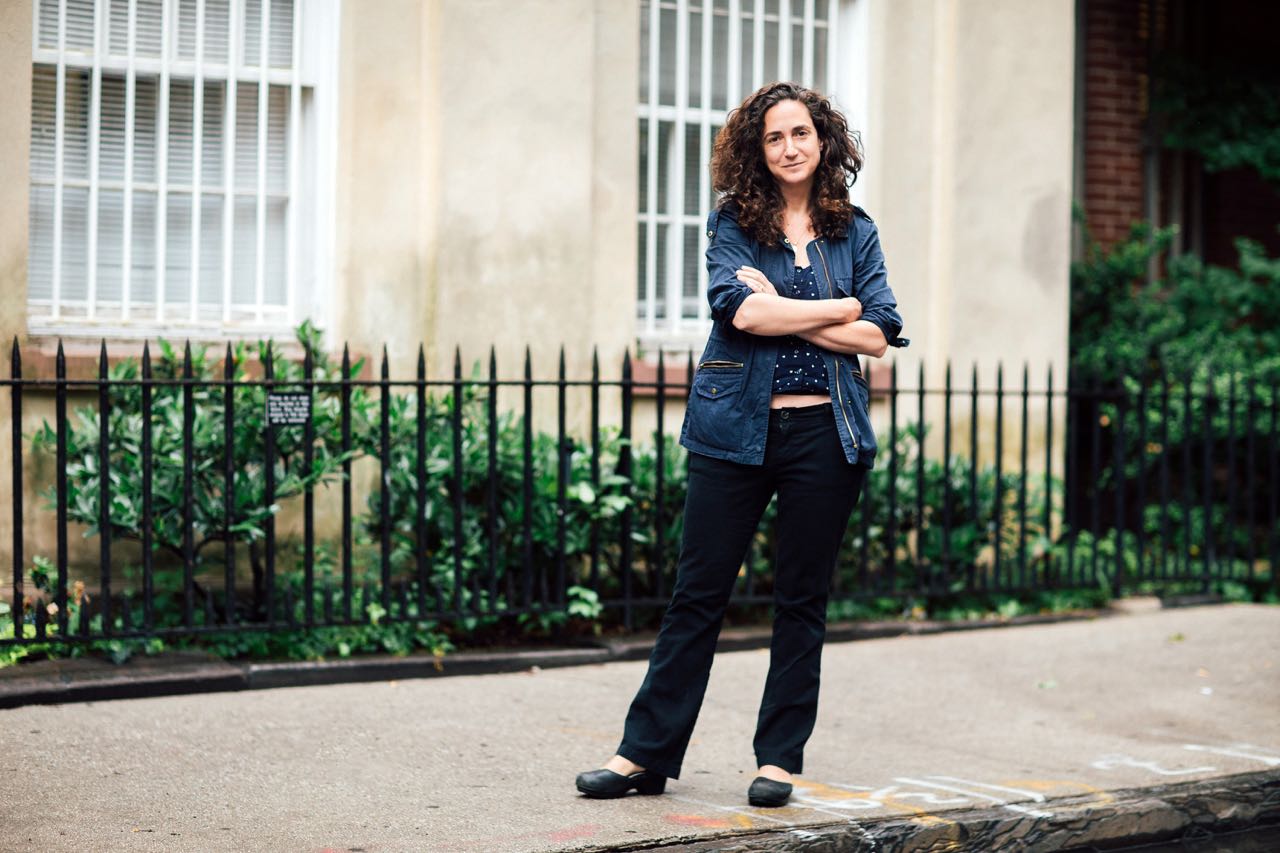
How has it been balancing this job with your work as a director?
You know, it’s really an interesting process for me, but as I think about programming for next season, I’m not thinking about directing anything at Rattlestick. I definitely don’t want to direct at Rattlestick next season and possibly for a couple of seasons. I think I want my focus at Rattlestick to be primarily focused on artistic directing the company. I have and will continue to have a couple of projects, I think, each year that are outside of the company, and I think that that is really good for the company and for me. I think being able to make sure that I stay in the field and I see the way that other companies are working, that I meet other artists, and that I work in different size theatres. It only feeds the kind of work by me staying connected to the theatre community at large, and I already feel the benefits of that in some way—both for the company and for the work. Next season I’m planning to do two shows: one at Arena Stage which is a new play by Jackie Lawton, and one that is a piece that I’ve been working on for nine years with Sheila Callaghan about water, and we’re doing it with New Georges. Neither of those pieces could happen at Rattlestick. They’re very specific kinds of experiences, so I don’t feel like they’re competitive with Rattlestick, but I feel like they’re complimentary with Rattlestick and Rattlestick’s mission. It’s new work because all I do is new work.
Was it a tough choice at all to decide to direct a little less?
No. I mean, this is really, really artistically engaging. This is engaging on all levels, so I feel quite full. I feel grateful that I can still do some directing and I feel really lucky to have both—and I also have a family so I’m glad to spend less time on the road. I think that being on the road six months of a year is a trickier thing to do when you’re raising a child as well.
As part of your job here, have you thought about how to make it easier for people to work in theatre and be parents?
It is a great question that I don’t have any answer for, yet. I feel like I’m just naturally more sensitive to it in every process because I know the complexity of it. Sometimes it’s about having an intern who can also babysit. Mostly I think what parents need is—well they need money, but they also need support. They need babysitting support and sort of hands on deck to help, and they need willingness for the team to be flexible when issues come up that relate to a child, and they need to miss some time in a certain way. I feel like rooted in my DNA is a flexibility about scheduling and is an awareness of the need for support, and then I will sort of tackle the issues that come up with parents working here as they come up and we’ll figure out our solutions as we go.
Do you worry that there’ll be more scrutiny on your choices as artistic director because you’re a woman?
No. I don’t. I think any artistic director has a responsibility to find the most exciting work they can find. I think there’s scrutiny on everybody. Being a freelance director for so long, I’m really used to scrutiny and I’m not afraid of it. I think that criticism can also make the work really strong. I guess again, talk to me in a couple of years, but at the moment, no. This is an exciting moment I feel like. I actually have a ton of mentors in this business who are artistic directors: Carey Perloff, and now Molly Smith. Loretta Greco and Julie Crosby and Lisa McNulty and a lot of people who I’ve worked with or directed for are women. Look, there’s still not a ton of women artistic directors out there. I’m very aware of that, but I feel like there’s a mindset of inclusivity and openness, and certainly there’s a conversation around women artists and making sure that women artists have a place at the table and how vital our voices are. Hillary being the nominee today. This is sort of an amazing moment, and I feel grateful to be part of this swell of support and openness.
Was there a learning curve for you of knowing how to go into a room and assert yourself and say, “These are my opinions,” and not apologize for them or anything like that?
I feel like experience obviously helps tremendously—experience and having good mentors. My confidence definitely grew with experience. Also, on the side, two years ago I started a business. The business is video memoirs for people in their seventies, eighties, nineties talking about their life, and it was an amazing experience for me to start something that wasn’t in theatre and really have to build it and create it. I probably made about a dozen documentaries since then for different families. That process has actually just been such a gratifying, fulfilling, and strengthening experience. There was something interesting about actually going outside of the theatre field and learning a lot. I feel like there’ve been a series of things in my life that have made me feel confident, and I think part of that is getting older and part of that is just experience, and I think part of that is being a mom and part of that is having good mentors, and part of that is running another business and part of that is seeing amazing women out there being so amazingly confident and being trailblazers, too.
Is mentoring something that you’re also going to do as part of Rattlestick?
Yeah. One of the best things about our field is that there is a spirit of generosity around mentorship. There have been amazing people in my life that I have assisted or worked for or met with, and I absolutely feel responsibility to take younger artists under my wing and support their work and also have them better understand the process and learn. I really feel that way. It’s so important to me that that’s part of the reason why Middle Voice—that’s the apprentice company of Rattlestick—really be integrated into the fold. The mentoring that we can do for that company is very important to me. These are future theatre makers and the current theatre makers who have big careers ahead of them in the future.

